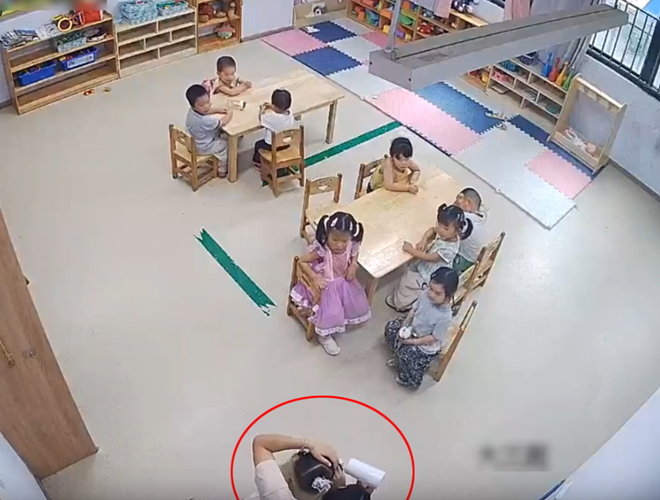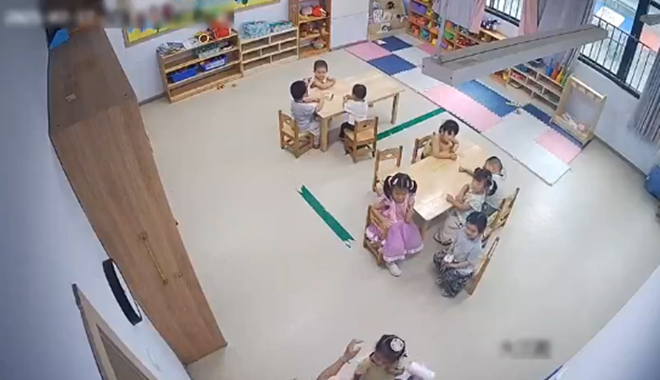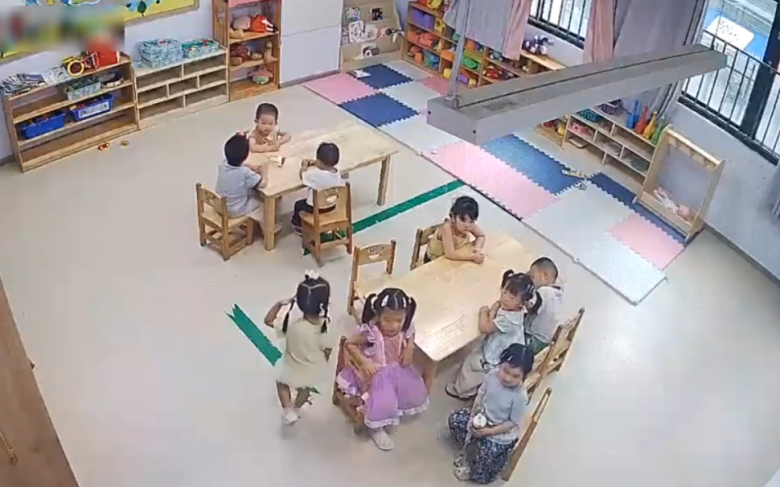It’s understandable that many parents feel anxious about sending their children to school, given the numerous heartbreaking stories of children experiencing harm within educational institutions.
A mother from Anhui, China, recently shared her own experience, which has resonated with many other parents.

However, her story offers a positive perspective that has the potential to change the attitudes and beliefs of many parents towards preschool teachers.
The mother shared that due to her busy work schedule, she often didn’t have time to check on her daughter’s well-being at school—how she was eating, learning, and playing.
On a rare day off, she decided to take a look at the classroom surveillance camera and witnessed a heartwarming scene.
In the footage, the teacher is seen taking a little girl to a corner, partially hidden from the camera’s view. Despite the limited visibility, the mother could understand what was happening.

The surveillance camera captured a small part of the teacher’s actions, which filled the mother with gratitude.
The little girl’s hair was drenched in sweat, and the teacher immediately took out a towel from her pocket to wipe the child’s hair. She then used a hairdryer to ensure the child’s hair was completely dry.
The mother was deeply touched by the teacher’s thoughtful and caring actions. Despite being a parent herself, she admitted that she had never considered that her child would receive such meticulous care at school.

The child returned to her seat after her hair was dried by the teacher.
The mother shared the video on social media, expressing her deepest gratitude to the preschool teacher. Many other parents left comments, praising the teacher’s actions.
“I don’t even take care of my own child this meticulously. Seeing my child being cared for and happy, I am truly grateful to the teacher.”
“It’s not just about teaching well; what’s most important for preschool teachers is having a heart for the children.”
“This child is so lucky to have such a wonderful teacher.”
“As a mother, all I want is for my child to be truly loved. This warms my heart.”
In today’s society, many families choose to have only one or two children, which allows them to focus more intensely on each child’s well-being and education. As a result, children have become like “treasures” to their parents, who often fear that their children will be harmed or mistreated, especially when they start attending school.
However, child psychology experts suggest that parents should learn to trust their children’s ability to navigate the world outside the home. Overprotectiveness and anxiety can hinder a child’s development.
First, trust the teachers and the school.
When you send your child to a particular school, it means you already have a level of trust in that institution. Extend that trust to the teachers and avoid nitpicking or questioning them over minor issues. Doing so can not only affect the teacher’s work but also have deeper implications for your child.
Second, communicate effectively with the teachers.
Instead of being critical, try to have open and respectful conversations with the teachers. With the advancement of communication tools, it’s even more important to interact appropriately and politely to find the best solutions.
Third, understand and respect the teachers.
Every profession has its challenges, and preschool teaching is no exception—it can be incredibly demanding. Remember that teachers have a conscience and a sense of responsibility for their work. So, try to be considerate of their challenges and communicate calmly, avoiding aggressive or argumentative behavior.
Why Won’t Mom Let Me Play With Her Phone? A Guide for Curious Kids.
“Screen time and kids: a delicate balance for parents to navigate. It’s an all-too-familiar scenario: your child, glued to the phone or tablet, seemingly oblivious to the world around them. As a parent, your natural instinct might be to worry about the impact of this on their development. But how you respond matters; it will shape their relationship with technology and influence their growth.”



































